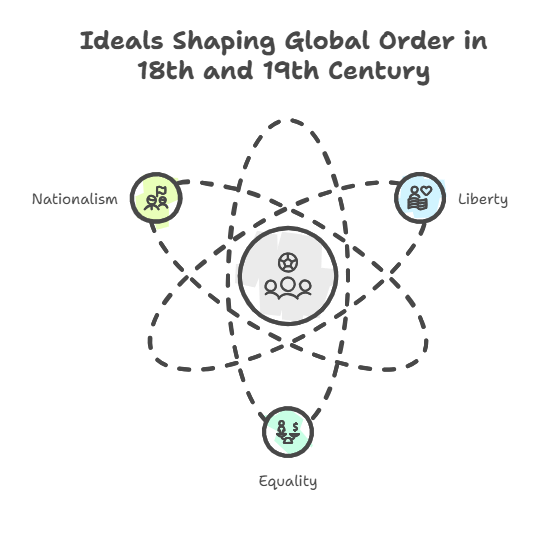- Filter By :
- Geography
- History
- Indian Heritage & Culture
- Indian Society
-
Q. The ideals of liberty, equality, and nationalism shaped the course of revolutions and redefined the global order in the 18th and 19th centuries. (250 words)
14 Jul, 2025 GS Paper 1 HistoryApproach:
- Introduce the answer by briefing about revolutions of 18th and 19th centuries
- Highlight Liberty and its Influence, Equality and its Role in Revolution and Nationalism and its Impact
- Conclude with a quote.
Introduction:
The 18th and 19th centuries were defining eras in world history, where the ideals of liberty, and equality challenged long-standing empires and monarchies. Inspired by Enlightenment thinkers, revolutions like the American Revolution and the French Revolution ignited the global quest for freedom and democratic governance.
- Nationalism, as seen in the unifications of Italy and Germany, reshaped political landscapes, while the rise of self-determination movements sowed the seeds for decolonization.
Body
- Liberty and its Influence:
- The Enlightenment Ideals: The 18th century Enlightenment thinkers such as John Locke, Jean-Jacques Rousseau, and Voltaire introduced the concept of liberty as an inalienable right of the individual.
- Locke’s notion of natural rights and Rousseau’s social contract inspired revolutionary movements.
- The American Revolution (1776): The American Revolution, inspired by Enlightenment principles, resulted in the Declaration of Independence, which asserted the inherent right to liberty and freedom from colonial rule. It laid the foundation for democratic principles in the new nation.
- The French Revolution (1789): The French Revolution was a direct response to the absolute monarchy and feudal system.
- The slogan “Liberté, égalité, fraternité” (Liberty, Equality, Fraternity) became emblematic of the revolution, as the French sought to establish a republic based on the rights of individuals.
- The Enlightenment Ideals: The 18th century Enlightenment thinkers such as John Locke, Jean-Jacques Rousseau, and Voltaire introduced the concept of liberty as an inalienable right of the individual.
- Equality and its Role in Revolution
- Social and Political Equality: The French Revolution and the subsequent Napoleonic reforms championed the cause of equality, particularly the abolition of aristocratic privileges and the declaration of the equality of all men before the law.
- The Declaration of the Rights of Man and Citizen (1789) was a critical document in affirming equality as a fundamental right.
- Abolition of Slavery: The ideals of equality also contributed to the abolition of slavery, particularly after the Haitian Revolution (1791-1804), which led to the establishment of the first independent black republic in the world, challenging the racial hierarchies of the colonial powers.
- Extension of Suffrage: Throughout the 19th century, equality also translated into political rights, as the expansion of suffrage began to take place in various European nations and the Americas, laying the groundwork for universal adult suffrage in the 20th century.
- Social and Political Equality: The French Revolution and the subsequent Napoleonic reforms championed the cause of equality, particularly the abolition of aristocratic privileges and the declaration of the equality of all men before the law.
- Nationalism and its Impact
- Emergence of Nationalist Movements: Nationalism, as a political ideology, emphasized the importance of a nation-state defined by shared culture, language, and history.
- This was a reaction against imperialism and the dominance of multinational empires, particularly in Europe and Latin America.
- The French Revolution and Nationalism: The French Revolution, by breaking away from the old feudal order, gave rise to a sense of French national identity, which was further solidified during the Napoleonic Wars.
- Napoleon’s conquests spread nationalist ideas across Europe, triggering similar movements in other nations.
- The Rise of Nationalism in Europe and Latin America: The early 19th century saw the spread of nationalist sentiments across Europe (e.g., the unification of Germany and Italy) and Latin America (e.g., the independence movements of Simon Bolívar and José de San Martín), as these regions sought to throw off colonial rule or unify their fragmented territories.
- The Revolutions of 1848: Known as the "Springtime of Nations," these uprisings across Europe were fueled by nationalist and democratic ideals.
- Although they were largely suppressed, they laid the foundation for future nationalist and liberal movements in the region.
- Emergence of Nationalist Movements: Nationalism, as a political ideology, emphasized the importance of a nation-state defined by shared culture, language, and history.
- Impact on the Global Order
- End of Monarchical Absolutism: The ideals of liberty and equality played a critical role in the decline of absolute monarchies and the spread of republicanism.
- The American and French Revolutions, as well as the rise of nationalist movements, challenged the traditional power structures that had dominated the globe for centuries.
- Rise of New States and Political Systems: The 19th century witnessed the formation of new states based on nationalism, such as Italy and Germany, and the dissolution of empires, including the Ottoman Empire and the Habsburg Empire, which was significantly weakened by nationalist movements within its territories.
- Colonial Impact: Nationalism and the demand for self-determination also had significant repercussions in the colonial world.
- As European powers were engaged in internal upheavals, colonial territories, particularly in Asia and Africa, began to resist imperial domination, planting the seeds for 20th-century decolonization.
- End of Monarchical Absolutism: The ideals of liberty and equality played a critical role in the decline of absolute monarchies and the spread of republicanism.
Conclusion
The ideals of liberty, equality, and nationalism were transformative forces that redefined global politics in the 18th and 19th centuries. They not only shaped revolutions but also laid the groundwork for modern democratic societies. As Thomas Jefferson once said, “The tree of liberty must be refreshed from time to time with the blood of patriots and tyrants.” These ideals continue to inspire the pursuit of justice and freedom worldwide.
To get PDF version, Please click on "Print PDF" button.
Print PDF





